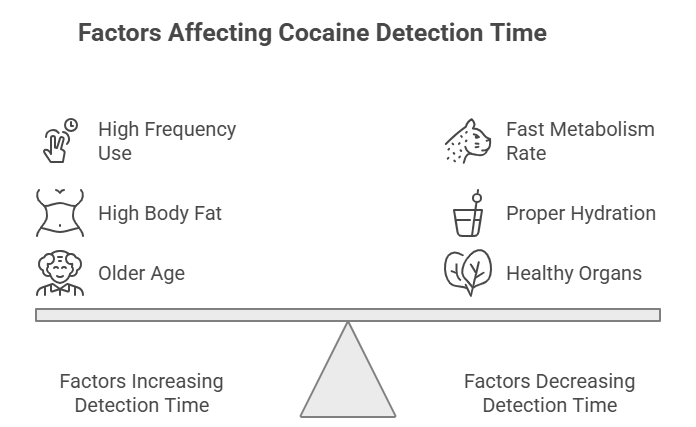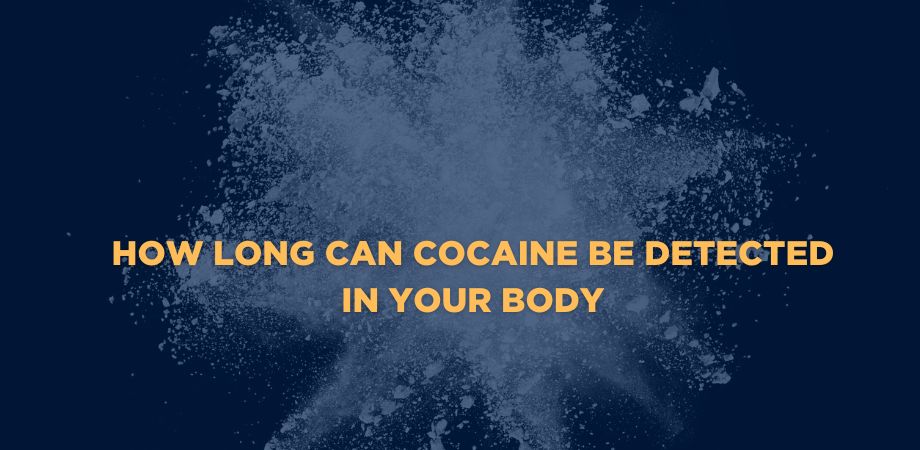Cocaine stays in your system for 1 to 4 days after use. The duration before detection in your blood or urine depends on the type of drug test used. The detection window depends mainly on factors such as the amount consumed, frequency of use, metabolism, and overall health. Detection in urine often targets benzoylecgonine, a metabolite of cocaine, which remains detectable longer than cocaine itself.
Several factors influence how long cocaine stays in the system: the dosage and purity of the drug, frequency and history of use, metabolic rate of the individual, presence of other substances, and the type of test administered. For example, heavy or chronic users tend to have longer detection times because the body may process and eliminate the drug more slowly.
In India, Cocaine use among women is very low, around 0.01%, compared to 0.18% in men, according to the same survey, according to Parmar, A., et al’s (2023) study titled “Understanding the epidemiology of substance use in India” published in the Indian Journal of Psychiatry.
To help clear cocaine from your system, staying hydrated, eating a healthy diet, and resting support your body’s natural detoxification processes. Professional detox and addiction treatment may be necessary for individuals with a cocaine use disorder to safely and effectively manage withdrawal and recovery.
What Factors Impact How Long Cocaine Stays in Your System?
The common factors that impact how long cocaine stays in your system include frequency and amount of use, metabolism rate, body fat percentage, age, liver and kidney health, hydration levels, and route of administration.
Among drug users reporting for treatment in India, the most significant number are in the age group 31-40 years (36.9%), followed by 20 years and below (a considerable share), showing that cocaine use spans both younger and middle-aged adults, according to a report by the Ministry of Social Justice and Empowerment (2023), titled, “Survey on Addiction of Drugs” published in the Journal of PIB Delhi.
Below are the factors that impact how cocaine stays in your system.
- Frequency and amount of use: More frequent or heavier use leads to longer detection times as the drug accumulates in the body. Chronic users have metabolites detectable for days or weeks after use.
- Metabolism rate: Faster metabolism breaks down cocaine and its metabolites quickly. Individual genetic differences and overall health significantly influence metabolic rate, altering how long cocaine stays detectable.
- Body fat percentage: Cocaine metabolites are stored in fat cells, extending detection time in individuals with higher body fat. This storage can lead to a slow release of metabolites back into the bloodstream, prolonging the detection window.
- Age: Older adults process cocaine more slowly due to reduced metabolic and organ function. Age-related decline in liver and kidney function further impairs the body’s ability to clear the drug efficiently.
- Liver and kidney health: These organs metabolise and excrete cocaine, so their efficiency affects clearance time. Impaired liver or kidney function can result in the prolonged presence of cocaine metabolites in the body.
- Hydration levels: Proper hydration helps dilute urine, which affects detection. However, extreme dilution may raise suspicion in drug tests and prompt retesting or alternative testing methods.
- Route of administration: Injection, snorting, or smoking cocaine affects how quickly the drug is processed. Each route influences the speed of absorption and peak concentration levels, thereby impacting detection time.
These factors help to assess how long cocaine remains detectable in the body, as individual differences in use patterns, physiology, and health significantly influence its presence in the system.

How Long Does Cocaine Stay in Urine?
Cocaine stays in urine for about 3 to 5 days after use. This detection window may be shorter or longer based on factors like the amount used, frequency of use, metabolism, age, body fat, and hydration levels.
For most occasional users, cocaine metabolites remain detectable in urine for up to 3 to 4 days after use. In some cases, detection extends to about 5 days. For chronic or heavy users, cocaine can be detected in urine for up to 2 weeks after the last use.
The urine test primarily detects benzoylecgonine, a metabolite of cocaine, which stays longer in the system than cocaine itself.
How Long Does Cocaine Stay in the Blood?
Cocaine stays in the blood for up to 2 days after use. This duration allows for testing to identify cocaine metabolites, primarily morphine and 6-monoacetylmorphine (6-MAM), which remain in the urine after the cocaine itself is metabolised.
The kidneys filter these metabolites into urine, making urine testing a common and effective method for detecting recent cocaine use due to its non-invasive nature and relatively long detection window.
How Long Does Cocaine Stay in Saliva?
Cocaine stays in saliva for up to 24 hours after use. The detection window is relatively short because saliva testing primarily identifies the parent drug, which has a short half-life, and is often most effective when cocaine is smoked.
The rapid metabolism and elimination of cocaine from the bloodstream mean it only remains traceable in saliva for about a day. Variations in detection time can occur depending on factors like the amount used, frequency of use, and the method of administration.
How Long Does Cocaine Stay in Hair?
Cocaine stays in the hair for up to 90 days or more after consumption. Cocaine metabolites enter the hair follicles from the bloodstream and remain trapped as hair grows. This method reflects long-term drug use rather than recent intake and is commonly used for historical drug use verification spanning several months.
What are the common withdrawal symptoms of Cocaine?
The common withdrawal symptoms of Cocaine are anxiety, muscle aches, sweating, nausea, vomiting, diarrhoea, insomnia, and intense drug cravings.
Below are the common withdrawal symptoms of cocaine.
- Anxiety: Intense feelings of nervousness, worry, and agitation commonly occur due to the body’s reaction to the absence of cocaine and the psychological dependence on the drug. This anxiety can manifest as restlessness and difficulty concentrating, making everyday tasks challenging.
- Muscle Aches: Severe cramps and joint pains, similar to those experienced during the flu, occur every day as the body readjusts from cocaine’s pain-blocking effects. These aches result from the body healing from prolonged stimulation and depletion of neurotransmitters that regulate pain and energy.
- Sweating: Profuse sweating often alternates with chills as the body tries to regulate its temperature during withdrawal. This symptom results from the body struggling to maintain a normal autonomic function after cocaine’s stimulant effects wear off.
- Nausea: A frequent sensation of queasiness that can lead to vomiting, part of the gastrointestinal distress seen in withdrawal. It reflects the body’s efforts to detoxify and rebalance after repeated cocaine exposure.
- Vomiting: The forceful removal of stomach contents, often accompanied by nausea, which can cause dehydration. This symptom is a protective reflex but significantly hinders proper nutrition and medication absorption.
- Diarrhoea: Frequent loose or watery bowel movements occur as the digestive system attempts to expel toxins and normalise after cocaine use. Diarrhoea causes dehydration and fatigue, complicating the withdrawal process if not managed properly. It also signals disruption in gut motility and the body’s effort to restore gastrointestinal balance.
- Insomnia: Difficulty falling asleep or staying asleep occurs due to physical discomfort, anxiety, and restlessness during withdrawal. Insomnia lasts several weeks, making recovery challenging without support and proper care.
- Intense Drug Cravings: Powerful urges to use cocaine again to relieve withdrawal symptoms and regain the euphoria can drive relapse. These cravings are driven by changes in brain chemistry and conditioned associations with drug use cues.
These symptoms begin within hours after the last dose, peak within 1-3 days, and gradually subside over about a week, though some psychological symptoms and cravings may persist longer.
How to Get Cocaine Out of Your System?
To get cocaine out of your system, the most effective methods include detoxification, hydration, a healthy diet, exercise, medications, and professional deaddiction treatment.
Below are ways of getting cocaine out of your system.
- Detoxification: Medical detox involves close monitoring by healthcare professionals to manage withdrawal symptoms safely and reduce the risk of complications. This process helps the body eliminate cocaine and its metabolites more effectively while providing support for physical and mental health.
- Hydration: Drinking plenty of water helps flush out toxins through urine, speeding up the elimination of cocaine metabolites. Staying well-hydrated also supports kidney function, which is crucial in filtering and clearing substances from the bloodstream.
- A Nutritious diet: A nutritious diet rich in fruits, vegetables, lean proteins, and whole grains supports liver function, which is essential for metabolising and breaking down cocaine. Proper nutrition also strengthens the immune system and helps repair damage caused by drug use.
- Exercise: Regular physical activity boosts metabolism, enhancing the body’s ability to process and eliminate drug residues. Exercise promotes the release of endorphins that help improve mood and reduce cravings during recovery.
- Medications: Medications like methadone or buprenorphine can ease withdrawal symptoms and reduce cravings, making it easier to complete the detox process. These drugs are often used in medically supervised settings to support a safer and more comfortable recovery.
- Professional de-addiction treatment: Structured treatment programs provide ongoing medical care, counselling, and social support tailored to individual needs, which significantly increase the chances of long-term sobriety. These programs also address the psychological and behavioural aspects of addiction, promoting healthier coping strategies.
Successfully getting cocaine out of your system requires a combination of medical care, lifestyle changes, and ongoing support to ensure both physical detoxification and long-term recovery.
What Is Cocaine?
Cocaine is a highly addictive stimulant drug derived from the leaves of the coca plant, which grows primarily in South America. It is commonly found in the form of a fine white powder called cocaine hydrochloride or as a solid rock form known as crack cocaine.
Cocaine increases levels of alertness, attention, and energy by acting on the brain’s chemical reward system, mainly by blocking the reuptake of dopamine, serotonin, and norepinephrine, which produces feelings of euphoria and increased energy.
How Long Does it Take to Get Addicted to Cocaine?
To get addicted to cocaine, it can take only a few uses, sometimes even from the first time. The drug acts quickly on the brain’s reward system, creating strong euphoric effects that can lead to physical dependence and compulsive use in a short time frame, especially with repeated exposure.
Research indicates that about 7.1% of cocaine users develop dependence within the first year, which is a faster progression compared to other drugs like alcohol or cannabis, according to Sartor, C. E., et al (2013) study titled, “Rate of Progression from First Use to Dependence on Cocaine or Opioids” published in the Addictive Behaviours Journal.
How to treat Cocaine addiction?
To treat cocaine addiction, a combination of medically supervised detoxification, medication-assisted treatment (using methadone, buprenorphine, or naltrexone), counselling, behavioural therapies, and long-term support through de-addiction centres is effective.





